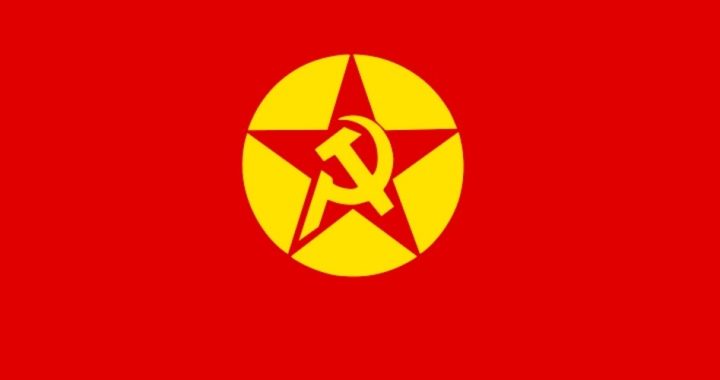
On Friday, March 1, an explosion from a suicide bomber rocked the U.S. Embassy in Ankara, Turkey, killing both a security guard and the bomber. Responsibility for the terrorist attack was claimed not by an Islamic terror group but rather by a self-described Marxist-Leninist group known as the Revolutionary People’s Liberation Party-Front.
Known in its native language as the Devrimci Halk Kurtulus Partisi-Cephesi (DHKP-C), it was officially founded in 1994 after splitting from the Marxist Turkish terror group Devrimci Sol, which translates into Karatas Faction. This faction itself was a splinter from Devrimci Yol, which too splintered from the original Turkish People’s Liberation Party-Front (THKP-C) of the 1970s.
The DHKP-C, like its ancestor the THKP-C, is an ideologically Marxist-Leninist, anti-Western group. Its flag (shown above) displays the communist hammer & sickle inside the red star. It advocates Turkey’s withdrawal from NATO and has branded its own country’s government as a Fascist regime. The U.S. State Department originally designated the group as a foreign terrorist organization (FTO) in 1997, and it remains on the Department’s list of FTOs. The DHKP-C is believed to have fewer than 1,000 members.
In a statement from the Revolutionary People’s Liberation Party-Front, they described their attack on the U.S. embassy as an “act of self-sacrifice” designed to target the United States, which they branded the “murderer of the people of the world,” according to the International Business Times.
In an interview with the International Business Times, Dr. Dilshod Achilov, assistant professor of political science at East Tennessee State University, explained that “the DHKP-C’s mentality, for instance, is still trapped in the Cold War. For them, the Cold War apparently never ended.”
While most mainstream academics and Western media outlets point to the fall of the Berlin Wall and the geopolitical fragmentation of the Soviet Union as evidence for the purported end of the Cold War and the alleged collapse of communism, Russian contemporaries see things differently. Does this mean that the Cold War is back?
“I don’t agree that the Cold War is back. It never ended,” said Andrei Lugovoi, a representative in the Russian Duma (parliament), in 2000. In 2007, Russian President Vladimir Putin reiterated the continuation of the Cold War by threatened the West with a “new spiral in the arms race.” In the eyes of the Russian government, the Cold War never ended; they are still fighting.
In an interview with FOX News in 2009, Russian KGB/FSB defector Sergei Tretyakov said, “Who told you that the Cold War was ever over? It transforms; it is like a virus.” In 2012, during a speech at a conference hosted by Cliff Kincaid at the National Press Club, in Washington, D.C., KGB/FSB defector Konstantin Preobrazhensky said, “Still, Russia is a Marxist country, that’s why Marxists don’t need to destroy Russian society.”
These are relevant points to bring up when asking questions such as, “Who is financing and arming the DHKP-C?” and “From where are they receiving their orders?” Conventional wisdom would suggest that Marxist-Leninist terrorism no longer originates out of Moscow, but history, as well as current-day defectors, augmented by clues from within, suggest that Russia remains an integral part, if not the head itself, of the international terror network.
In her book The Terror Network, published by Reader’s Digest in 1980, Claire Sterling documented and outlined how the Soviet Union oversaw and directed a vast international terrorist network.
Is it logical to deduce that the alleged demise of the Communist Party’s monopoly of power in Moscow resulted in the magical disappearance of communism as a menace against the West overnight?
The DHKP-C is affiliated with the Italian-based Armed Cells for International Solidarity (Solidarieta Internazionale). International Solidarity is an umbrella organization for radical far-left Marxist militant groups throughout Europe, including the Basque Fatherland and Freedom (ETA) in Spain, the July 20th Brigade in Italy, and also the New Red Brigades/Communist Combatant Party (BR/PCC) in Italy.
The New Red Brigades/Communist Combatant Party maintains its ideological solidarity with Russia. In a secret U.S. State Department cable dated January 26, 2009, then-U.S. Ambassador to Italy Ronald Spogli observed that although “Putin’s Russia bears little resemblance to Communist ideals, this fact has not deterred Italian communists and other radical left politicians from being openly pro-Russia on the basis of ideological solidarity.”
Despite headlines, such as that of the International Business Times which reads “Turkish Communists: Still Waging A Cold War That No Longer Exists,” the fact is if the communists are still fighting, then the fighting is not over. The DHKP-C’s attack on the U.S. Embassy in Ankara serves as yet more evidence for the ever-mounting case that Marxism-Leninism is not dead but remains a force of international instability.
Related articles:
Communists Plant Bomb at World Economic Forum
Red Brigades, Italy’s Communist Terrorist Group, Threatens Officials




